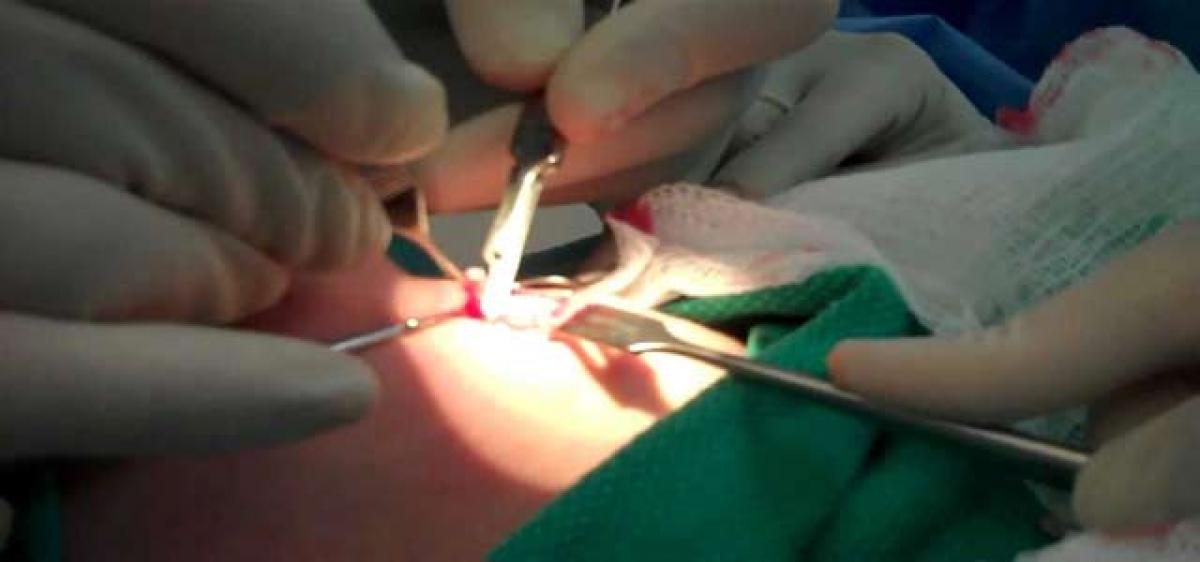Live
- Group-3 exams in Wanaparthy district peacefully*
- Shraddha Das reigns as a fashion icon
- ‘Sarangapani Jathakam’ teaser set for Nov 21st release
- Nadendla Manohar announces WhatsApp services for grain purchase
- AP DCM Pawan Kalyan Addresses Public Rally in Ballarpur, Maharashtra
- ‘Pushpa The Rule’ trailer launch event: Massive fan frenzy in Patna
- Jyothika slams negative campaign on ‘Kanguva’
- It’s official: Naga Chaitanya and Sobhita Dhulipala to tie the knot in December
- ‘Kantara: Chapter 1’ locks release date for Oct 2025
- Telangana to Implement New EV Policy from Tomorrow, Aims for Cleaner Environment
Just In

Patients going for surgery should bathe or shower beforehand but their surgical site should not be shaved, and antibiotics should be used to prevent infections before and during surgery, but not afterwards, the World Health Organisation said on Thursday.
London: Patients going for surgery should bathe or shower beforehand but their surgical site should not be shaved, and antibiotics should be used to prevent infections before and during surgery, but not afterwards, the World Health Organisation said on Thursday.
In new guidelines aimed at halting the spread of potentially deadly superbug infections in hospitals and clinics worldwide, the WHO said obsessive dedication to cleanliness and hygiene was crucial, as was the careful use of anti-infectives.
Surgical site infections are caused by bacteria getting into the body through incisions made during surgery. They put millions of patients worldwide at risk each year and exacerbate the spread of antibiotic resistant superbugs such as MRSA.
"No one should get sick while seeking or receiving care," Marie-Paule Kieny, the WHO's assistant director-general for health systems and innovation, said in a statement as the new recommendations were published.
The guidelines range from simple precautions such as ensuring patients take a bath or shower before surgery and ensuring surgical teams use the best possible methods in cleaning their hands, to advice on when to give antibiotics to prevent infections, what disinfectants are best before incision, and which sutures doctors should use.
Importantly, the guidelines recommend patients are given antibiotics to prevent infections before and during surgery only - a measure the WHO described as crucial to slowing the spread of antibiotic resistance.
In a change to current common practice, the guidelines said antibiotics should not be used after surgery unless the patient has contracted an infection.
"Preventing surgical infections... requires a range of preventive measures. These guidelines are an invaluable tool for protecting patients," Kieny said.
According to WHO figures, some 11 percent of patients in poor and middle-income countries who have surgery pick up an infection during their operation. In Africa, up to a fifth of women who have a caesarean section get wound infections.
But surgical site infections are not just a problem for poorer countries. In the United States, according to the WHO, they contribute to patients spending some 400,000 extra days in hospital at an additional annual cost of an $900 million.
Ed Kelly, a WHO service delivery and safety expert, noted that some of the recommendations would mean reversing previous practice, such as the shaving of body hair before surgery.
The new advice not to shave is based on extensive evidence that shaving greatly increases the risk of micro-abrasions and small cuts in the skin, he said, which in turn raise the risk of bacteria entering the body.
Kelly said the list of 29 recommendations, drawn up by 20 international experts, were valid for any country and suitable to local adaptations, and take into account costs, resources and the strength of available scientific evidence.
By: Kate Kelland

© 2024 Hyderabad Media House Limited/The Hans India. All rights reserved. Powered by hocalwire.com







